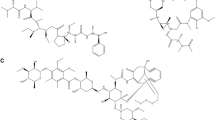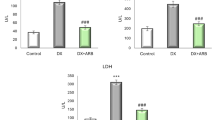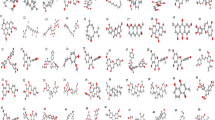Abstract
A conventional plant flavonoid known as myricetin is well-known for its wide range of effects, including its strong anti-inflammatory, anti-cancer, and antioxidant characteristics. In this study, we examined anti-inflammatory potential of Myricetin (MN) by looking at the expressions of COX-2, IL-6 and TNF-α in leukemia cancer cell lines (THP-1). The THP-1 was cultured in Roswell Park Memorial Institute medium supplemented with 10% foetal bovine serum and penicillin (100 U/ml) for the purposes of the in-vitro investigations. Cell viability and cytotoxicity testing were done using the MTT assay. To prepare the ligand and proteins for the in-silico studies, The structures of the targeted anti-inflammatory proteins COX-2 (PDB ID: 5KIR), TNF- (PDB ID: 1TNF), and IL-6 (PDB ID: 1ALU) were retrieved from Protein Data Bank. Furthermore, docking experiments were carried out using the AutoDock Vina software. In comparison to the reference drug cisplatin (9.46 µg/ml) the IC50 value for MN was found to be 90.161 µg/ml. The cells pretreated with MN showed a significantly lower expression of anti-inflammatory components (COX-2, TNF-α and IL6) upon measured by geometric mean fluorescence intensity as compared to the LPS-induced control cells. Additionally, MN has shown a strong interaction with COX-2, TNF-α and IL-6 in simulation studies. To conclude, MN exhibits a potent anti-inflammatory effect both in-silico and in-vitro studies. Further, in vivo investigations are needed to gain more comprehensive understanding of the molecule.





Similar content being viewed by others
References
Abdellatif KRA, Abdelall EKA, Labib MB, Fadaly WAA, Zidan TH (2020) Synthesis of novel halogenated triarylpyrazoles as selective COX-2 inhibitors anti-inflammatory activity, histopathological profile and in-silico studies. Bioorg Chem 105:104418. https://doi.org/10.1016/j.bioorg.2020.104418
Ahmed SM, Luo L, Namani A, Wang XJ, Tang X (2017) Nrf2 signaling pathway: pivotal roles in inflammation. Biochem Biophys Acta Mol Basis Dis 2:585–597. https://doi.org/10.1016/j.bbadis.2016.11.005
Almassabi R, Huwait E, Almowallad S, Saddeek S, Gauthaman K (2021) In vitro: The modulating effect of myricetin on the atherosclerosis related processes in THP1 macrophages. J Pharm Res. https://doi.org/10.9734/jpri/2020/v32i4731116
Arranz-Valsero I, Soriano-Romani L, Garcia-Posadas L, Lopez-Garcia A, Diebold Y (2014) IL-6 as a corneal wound healing mediator in an in vitro scratch assay. Exp Eye Res 125:183–192. https://doi.org/10.1016/j.exer.2014.06.012
Brahma S, Goyal AK, Dhamodhar P, Kumari MR, Jayashree S, Usha T, Middha SK (2023) Can polyherbal medicine be used for the treatment of diabetes?—a review of historical classics, research evidence and current prevention programs. Curr Diabetes Rev. https://doi.org/10.2174/1573399819666230314093721
Brenner DR, Scherer D, Muir K, Schildkraut J, Boffetta P, Spitz MR et al (2014) A review of the application of inflammatory biomarkers in epidemiologic cancer research. Cancer Epidemiol Biomark Prev 23(9):1729–1751. https://doi.org/10.1158/1055-9965.epi-14-0064
Chanput W, Mes JJ, Wichers HJ (2014) THP-1 cell line: an in vitro cell model for immune modulation approach. Int Immunopharmacol 23(1):37–45. https://doi.org/10.1016/j.intimp.2014.08.002
Chen Q, Niu X, Li N (2017) Exploring the natural chemiome to target interleukin-6 receptor (IL-6R) cytokines: an atomic scale investigation for novel rheumatoid arthritis drug discovery. Braz J Pharm Sci 53(3):e17256. https://doi.org/10.1590/s2175-97902017000317256
Chen L, Deng H, Cui H, Fang J, Zuo Z, Deng J (2018) Inflammatory responses and inflammation-associated diseases in organs. Oncotarget 9(6):7204–7218. https://doi.org/10.18632/oncotarget.23208
Cho BO, Yin HH, Park SH, Byun EB et al (2016) Anti-inflammatory activity of myricetin from Diospyros lotus through suppression of NF-κB and STAT1 activation and Nrf2-mediated HO-1 induction in lipopolysaccharide-stimulated RAW264.7 macrophages. Biosci Biotechnol Biochem 80(8):1520–1530. https://doi.org/10.1080/09168451.2016.1171697
Dhivya S, Suresh Kumar C, Bommuraj V, Janarthanam R, Chandran M, Usha T, Middha SK (2018) A study of comparative modelling, simulation and molecular dynamics of CXCR3 receptor with lipid bilayer. J Biomol Struct Dyn 36(9):2361–2372. https://doi.org/10.1080/07391102.2017.1354783
Duan J, Yue W, E JY, Malhotra J, Lu SE, Gu J, Xu F, Tan XL, (2016) In vitro comparative studies of resveratrol and triacetyl resveratrol on cell proliferation, apoptosis, and STAT3 and NFκB signaling in pancreatic cancer cells. Sci Rep 6:31672. https://doi.org/10.1038/srep31672
Dutta S, Prashanth KHP, Ramesh N, Middha SK (2022) Systematic analysis of quercetin and its derivatives with special reference to anti-inflammatory property-based on network pharmacology. Plant Sci Today 9(sp2):41–46. https://doi.org/10.14719/pst.1705
Eberhardt J, Santos-Martins D, Tillack AF, Forli S (2021) AutoDock vina 1.2.0: new docking methods, expanded force field, and python bindings. J Chem Inf Model 61(8):3891–3898. https://doi.org/10.1021/acs.jcim.1c00203
Ha TK, Jung I, Kim ME, Bae SK, Lee JS (2017) Anti-cancer activity of myricetin against human papillary thyroid cancer cells involves mitochondrial dysfunction-mediated apoptosis. Biomed Pharmacother 91:378–384. https://doi.org/10.1016/j.biopha.2017.04.100
Hirano T (2020) IL-6 in inflammation, autoimmunity and cancer. Int Immunol 33(3):127–148. https://doi.org/10.1093/intimm/dxaa078
Ho KV, Schreiber KL, Vu DC, Rottinghaus SM, Jackson DE, Brown CR et al (2019) Black walnut (Juglans nigra) extracts inhibit pro-inflammatory cytokine production from LPS-stimulated human pro-monocytic cell line U-937. Front Pharmacol 10:1059. https://doi.org/10.3389/fphar.2019.01059
Hwang SJ, Kim YW, Park Y, Lee HJ, Kim KW (2014) Anti-inflammatory effects of chlorogenic acid in lipopolysaccharide stimulated RAW 264.7 cells. Inflamm Res 63(1):81–90. https://doi.org/10.1007/s00011-013-0674-4
Jang JH, Lee K, Jung SC, Yoo KH, Park G (2020) Inhibitory effects of myricetin on lipopolysaccharide induced neuroinflammation. Brain Sci 10(1):32. https://doi.org/10.3390/brainsci10010032
Jitprasertwong P, Khamphio M, Petsrichuang P, Eijsink VGH, Poolsri W, Muanprasat C et al (2021) Anti-inflammatory activity of soluble chito-oligosaccharides (CHOS) on VitD3-induced human THP-1 monocytes. PLoS ONE 16(2):e0246381. https://doi.org/10.1371/journal.pone.0246381
Ju Z, Li M, Xu J, Howell DC, Li Z, Chen FE (2022) Recent development on COX-2 inhibitors as promising anti-inflammatory agents: the past 10 years. Acta Pharm Sin B 12(6):2790–2807. https://doi.org/10.21203/rs.3.rs-2966023/v1
Kan X, Liu B, Guo W, Wei L, Lin Y, Guo Y, Gong Q, Li Y, Xu D, Cao Y, Huang B, Dong A, Ma H, Fu S, Liu J (2019) Myricetin relieves LPS-induced mastitis by inhibiting inflammatory response and repairing the blood-milk barrier. J Cell Physiol 234(9):16252–16262. https://doi.org/10.1002/jcp.28288
Kim HH, Kim DH, Kim MH, Oh MH, Kim SR, Park kJ, Lee MW, (2013) Flavonoid constituents in the leaves of Myrica rubra sieb. et zucc. with anti-inflammatory activity. Arch Pharm Res 36(12):1533–1540. https://doi.org/10.1007/s12272-013-0147-x
Kopp KL, Kauczok CS, Lauenborg B, Krejsgaard T, Eriksen KW, Zhang Q, Wasik MA, Geisler C, Ralfkiaer E, Becker JC, Ødum N, Woetmann A (2010) COX-2-dependent PGE(2) acts as a growth factor in mycosis fungoides (MF). Leukemia 24(6):1179–1185. https://doi.org/10.1038/leu.2010.66
Kubatka P, Mazurakova A, Samec M, Koklesova L, Zhai K, Al-Ishaq R, Kajo K, Biringer K, Vybohova D, Brockmueller A, Pec M, Shakibaei M, Giordano FA, Büsselberg D, Golubnitschaja O (2021) Flavonoids against non-physiologic inflammation attributed to cancer initiation, development, and progression-3PM pathways. EPMA J 12(4):559–587. https://doi.org/10.1007/s13167-021-00257-y
Kumar HPP, Dutta S, Usha T, Middha SK (2020) preliminary phytochemical analysis and antioxidants properties of Myrica nagi—a Himalayan jewel. J Crit Rev 7(13):4046–4054
Landskron G, De la Fuente M, Thuwajit P, Thuwajit C, Hermoso MA (2014) Chronic inflammation and cytokines in the tumor microenvironment. J Immunol Res 2014:149185. https://doi.org/10.1155/2014/149185
Ledda S, Sanna G, Manca G, Franco MA, Porcu A (2010) Variability in flavonol content of grapes cultivated in two Mediterranean islands (Sardinia and Corsica). J Food Compos Anal 23(6):580–585. https://doi.org/10.1016/j.jfca.2009.05.006
Medzhitov R (2010) Inflammation 2010: new adventures of an old flame. Cell 140(6):771–776. https://doi.org/10.1016/j.cell.2010.03.006
Middha SK, Usha T, Pande V (2013) HPLC evaluation of phenolic profile, nutritive content and antioxidant capacity of extracts obtained from Punica granatumfruit peel. Adv Pharmacol Sci 2013:296236. https://doi.org/10.1155/2013/296236
Middha SK, Usha T, Pande V (2013a) A review on antihyperglycemic and antihepatoprotective activity of eco-friendly Punica granatum peel waste. Evid Based Complement Altern Med Ecam. https://doi.org/10.1155/2013/656172
Middha SK, Usha T, Basistha BC, Goyal AK (2019) Amelioration of antioxidant potentialats, toxicity, and antihyperglycemic activity of Hippophaesalicifolia D. Don leaf extracts in alloxan-induced diabetic rats. 3 Biotech 9(8):308. https://doi.org/10.1007/s13205-019-1840-3
Parameswaran N, Patial S (2010) Tumor necrosis factor-α signaling in macrophages. Crit Rev Eukaryot Gene Expr 20(2):87–103. https://doi.org/10.1615/critreveukargeneexpr.v20.i2.10
Pedernera AM, Guardia T, Calderon CG, Rotelli AE, de la Rocha NE, Genaro SD, Pelzer LE (2006) Anti-ulcerogenic and anti-inflammatory activity of the methanolic extract of Larrea divaricata Cav. in rat. J Ethnopharmacol 105(3):415–420. https://doi.org/10.1016/j.jep.2005.11.016
Semwal DK, Semwal RB, Combrinck S, Viljoen A (2016) Myricetin: a dietary molecule with diverse biological activities. Nutrients 8(2):90. https://doi.org/10.3390/nu8020090
Shah K, Mujwar S, Gupta JK, Shrivastava SK, Mishra P (2019) Molecular docking and In Silico cogitation validate mefenamic acid prodrugs as human cyclooxygenase-2 inhibitor. Assay Drug Dev Technol 17(6):285–291. https://doi.org/10.1089/adt.2019.943
Sugihara N, Arakawa T, Ohnishi M, Furuno K (1999) Anti- and prooxidative effects of flavonoids on metal-induced lipid hydroperoxide-dependent lipid peroxidation in cultured hepatocytes loaded with α-linolenic acid. Free Radic Biol Med 27(11–12):1313–1323. https://doi.org/10.1016/s0891-5849(99)00167-7
Takano-Ishikawa Y, Goto M, Yamaki K (2006) Structure-activity relations of inhibitory effects of various flavonoids on lipopolysaccharide-induced prostaglandin E2 production in rat peritoneal macrophages: comparison between subclasses of flavonoids. Phytomedicine 13(5):310–317. https://doi.org/10.1016/j.phymed.2005.01.016
Takeuchi O, Akira S (2010) Pattern recognition receptors and inflammation. Cell 140(6):805–820. https://doi.org/10.1016/j.cell.2010.01.022
Usha T, Pradhan S, Goyal AK, Dhivya S, Kumar HP, Singh MK, Joshi N, Basistha BC, Murthy KS, Selvaraj S, Middha SK (2017a) Molecular simulation-based combinatorial modeling and antioxidant activities of Zingiberaceae family rhizomes. Pharmacogn Mag 13(Suppl 3):S715. https://doi.org/10.4103/pm.pm_82_17
Usha T, Shanmugarajan D, Goyal AK, Kumar CS, Middha SK (2017b) Recent updates on computer-aided drug discovery: time for a paradigm shift. Curr Top Med Chem 17(30):3296–3307. https://doi.org/10.2174/1568026618666180101163651
Usha T, Middha SK, Shanmugarajan D, Babu D, Goyal AK, Yusufoglu HS (2021b) Gas chromatography-Mass spectrometry metabolic profiling, molecular simulation and dynamics of diverse phytochemicals of Punica granatum L. leaves against estrogen receptor. Front in Biosci (landmark Edition) 26(9):423–441. https://doi.org/10.52586/4957
Wang L, Tu YC, Lian TW, Hung JT, Yen JH, Wu MJ (2006) Distinctive antioxidant and antiinflammatory effects of flavonols. J Agric Food Chem 54:9798–9804. https://doi.org/10.1021/jf0620719
Yatam S, Jadav SS, Gundla KP, Paidikondala K, Ankireddy AR, Babu BN, Ahsan MJ, Gundla R (2019) 2-Mercapto benzthiazole coupled benzyl triazoles as new COX-2 inhibitors: design, synthesis, biological testing and molecular modeling studies. ChemistrySelect 4(37):11081–11092. https://doi.org/10.1002/slct.201902972
Zhao D, Jiang Y, Sun J, Li H, Huang M, Sun X, Zhao M (2019) Elucidation of the anti-inflammatory effect of vanillin InLps-activated THP-1 cells. J Food Sci 84(7):1920–1928. https://doi.org/10.1111/1750-3841.14693
Acknowledgements
Authors acknowledge the facilities provided by Maharani Lakshmi Ammanni College For Women (mLAC). The partial work was carried out in DST-FIST for PG Level O facility (SR/FST/College-2018-404) and DBT-BIF facility at mLAC.
Author information
Authors and Affiliations
Contributions
This is the PhD work of KN. KN conducted the work and wrote the manuscript, KN. and TU provided analysis support, RN. Supported with wet laboratory work and data analysis, HPP supported with review and corrections, SKM and NR conceptualised the projects, SKM also arranged the funding and all authors reviewed the manuscript.
Corresponding author
Ethics declarations
Ethical statement
This article does not contain any studies involving animals performed by any of the authors. This article does not contain any studies involving human participants performed by any of the authors.
Conflict of interest
Khushbu Nishad has no conflict of interest. Talambedu Usha has no conflict of interest. H. P. Prashanth Kumar has no conflict of interest. Nijalingappa Ramesh has no conflict of interest. Sushil Kumar Middha has no conflict of interest.
Additional information
Publisher's Note
Springer Nature remains neutral with regard to jurisdictional claims in published maps and institutional affiliations.
Rights and permissions
Springer Nature or its licensor (e.g. a society or other partner) holds exclusive rights to this article under a publishing agreement with the author(s) or other rightsholder(s); author self-archiving of the accepted manuscript version of this article is solely governed by the terms of such publishing agreement and applicable law.
About this article
Cite this article
Nishad, K., Usha, T., Kumar, H.P.P. et al. Anti-inflammatory potential of myricetin in leukemia cells: in silico and in vitro exploration. ADV TRADIT MED (ADTM) (2024). https://doi.org/10.1007/s13596-023-00740-z
Received:
Accepted:
Published:
DOI: https://doi.org/10.1007/s13596-023-00740-z




